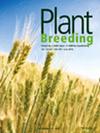对小麦(Triticum aestivum L.)高效杂交种子生产中雌性种子产量定量遗传组成的初步认识
IF 1.8
4区 农林科学
Q2 AGRONOMY
引用次数: 0
摘要
小麦(Triticum aestivum L.)的杂交育种受到其自花授粉特性的限制。过去的异花授粉改良大多集中在优化雄性性状上。我们在多环境田间试验中测试了 100 个经化学杂交剂(CHA)处理并由未经消毒的雄性植株授粉的多样化精英品系的杂交种子产量。同时还评估了雌株的株高和物候性状。同时,还进行了未经 CHA 灭菌的对照试验,以测定受试材料的单产。杂交种子产量变异属于定量遗传性质,尽管受环境影响较大,但这一性状具有很强的基因型成分和高度遗传性(h2 = .77)。杂交种子产量与本身产量之间缺乏相关性,这表明两者之间没有共同的遗传控制。表型性状及其交互作用是解释约 1/3 杂交种子产量变异的重要因素。与受主要遗传因素影响的株高和开花性状不同,杂交种子产量没有发现显著的标记-性状关联,这表明杂交种子产量具有高度多基因遗传结构,需要更大的群体来研究雌性杂交种子产量。本文章由计算机程序翻译,如有差异,请以英文原文为准。
First insights into the quantitative genetic composition of the female seed yield for an efficient hybrid seed production in wheat (Triticum aestivum L.)
Hybrid breeding of wheat (Triticum aestivum L.) is limited by its self-pollinating nature. Past cross-pollination improvements mostly focused on optimizing male traits. We tested the hybrid seed yield of 100 diverse elite lines treated with a chemical hybridization agent (CHA) and pollinated by non-sterilized male plants in multi-environmental field trials. Plant height and phenological traits of female plants were also assessed. In parallel, control experiments without CHA sterilization were conducted to measure per se yield of the tested material. Hybrid seed yield variation is of quantitative genetic nature, and, despite the large environmental influence, this trait has a strong genotypic component and is highly heritable (h2 = .77). The lack of correlation between hybrid seed yield and per se yield suggests a non-shared genetic control. Phenological traits and their interactions are important factors explaining together ~1/3 of hybrid seed yield variation. In contrast to plant height and flowering traits, which are influenced by major genetic factors, no significant marker–trait associations were found for the hybrid seed yield, thus suggesting a highly polygenic genetic architecture and the need of larger populations to investigate female hybrid seed yield.
求助全文
通过发布文献求助,成功后即可免费获取论文全文。
去求助
来源期刊

Plant Breeding
农林科学-农艺学
CiteScore
4.40
自引率
5.00%
发文量
74
审稿时长
3.0 months
期刊介绍:
PLANT BREEDING publishes full-length original manuscripts and review articles on all aspects of plant improvement, breeding methodologies, and genetics to include qualitative and quantitative inheritance and genomics of major crop species. PLANT BREEDING provides readers with cutting-edge information on use of molecular techniques and genomics as they relate to improving gain from selection. Since its subject matter embraces all aspects of crop improvement, its content is sought after by both industry and academia. Fields of interest: Genetics of cultivated plants as well as research in practical plant breeding.
 求助内容:
求助内容: 应助结果提醒方式:
应助结果提醒方式:


